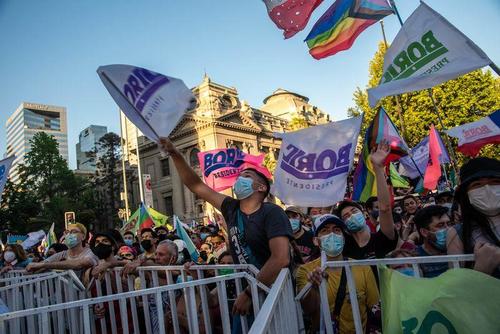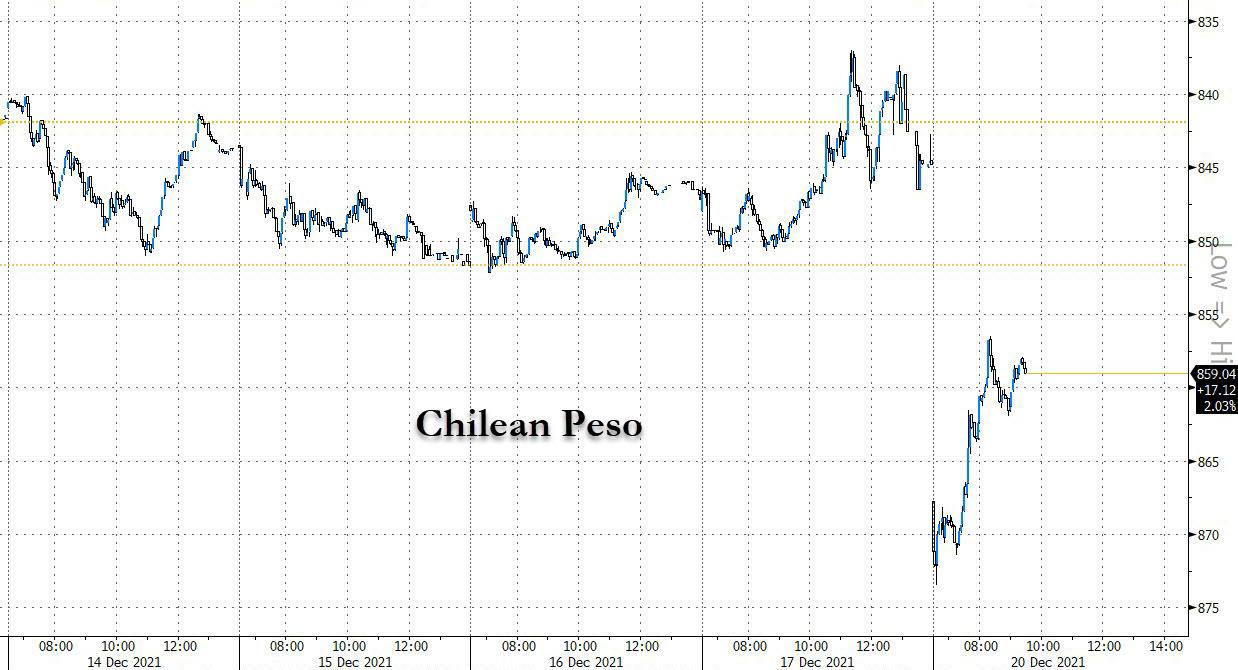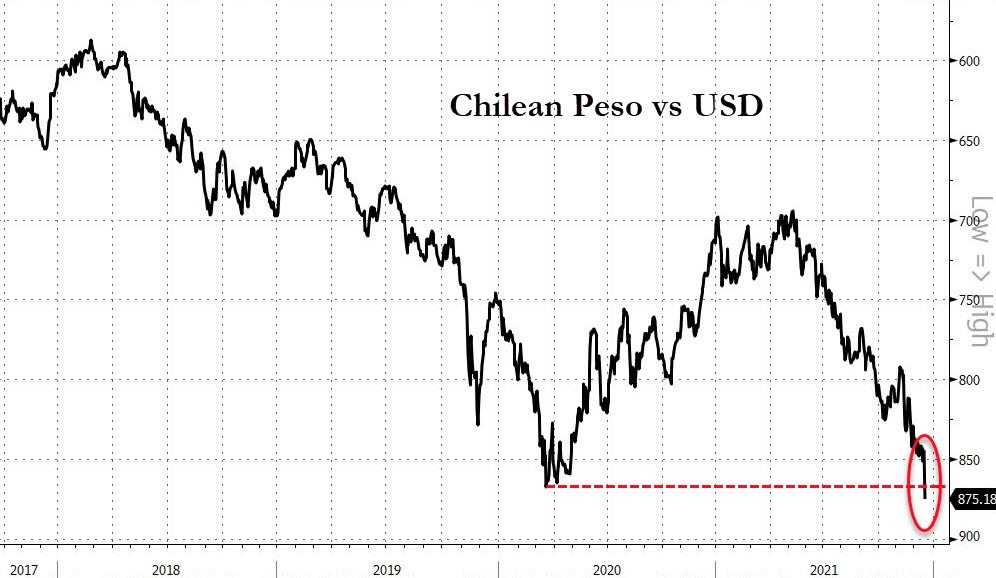Peso Hits Record Lows As Leftist Boric Wins Chile Presidency In "Worst Scenario Markets Could Have Envisioned"
Leftist Gabriel Boric, a former student protest leader, won the final round of Chile’s presidential election by a wide margin as the copper-rich Latin American country took a decisive shift to the left after several years of civil unrest. Boric secured 56% of the vote in Sunday’s runoff, well ahead of José Antonio Kast, his ultra-conservative rival, on 44%. The victory, Bloomberg notes, is likely to spook markets that fear interventionist policies. Boric, 35, will take office in March as one of the youngest presidents in the world and with an ambitious agenda.
“I am going to be the president of all Chileans, whether you voted for me or not,” said Boric. The 35-year-old president-elect, who will take office on March 11, said he would strive for unity after a bitter contest between extremes of the political spectrum.

Gabriel Boric during an election night rally in Santiago, on Dec. 19
Boric, who is unmarried, bearded, and tattooed, first gained prominence a decade ago when he led nationwide demonstrations calling for free and high-quality education. He ran successfully for lower house deputy in 2013 and was re-elected to a second term in a landslide vote. He is the first leader to come from outside the centrist political mainstream that has largely ruled Chile since its return to democracy in 1990. He is also the youngest Chilean president in more than two centuries and the first to secure a second-round victory after losing the first round.
His win in a runoff paves the way not only for a generational shift but also for the biggest economic changes in decades for one of Latin America’s richest countries, a global financial market favorite. It was a highly polarized campaign that only moderated in the final stretch as both contenders wooed centrists. He will face enormous challenges including a divided congress, sharp economic slowdown, the writing of a new constitution and the lingering threat of social unrest.
“We cannot continue to allow the poor to pay for the inequalities of Chile,” Boric told thousands of cheering supporters in a fiery victory speech which also acknowledged all he needs to do to build alliances. “We will reach out and build bridges so our citizens can live a better life.”
He repeated something he told President Sebastian Pinera in a conversation between them broadcast after results were announced: “The agreements need to be among all Chileans and not made behind closed doors.”They will meet Monday to begin the transition. Kast quickly conceded and spoke to Boric on Sunday evening.
During his victory speech, Boric, who is part of a broad leftwing coalition that includes the Chilean Communist party, said he would oppose mining initiatives that “destroy” the environment. That included the contentious $2.5Bn Dominga mining project that was approved this year.
“We are a generation that emerged in public life demanding our rights be respected as rights, and not treated like consumer goods or a business,” he said. He has also pledged to enact higher taxes, greater public spending, the scrapping of private pension schemes and student debt, as well as other reforms intended to empower women, indigenous groups and minorities.
Boric wants to dismantle some pillars of Chile’s economy such as its private pension funds, which form the bedrock of the local capital markets. He backs higher taxes on both the rich and the nation’s crucial mining industry -- Chile is the world’s biggest copper producer -- while also promising to keep government debt in-check.
* * *
Boric's victory was greeted with joy (for now, although check back in a few months): streets across the nation of 19 million were filled with honking cars and waving banners in celebration of the changing of the guard. Turnout was about 56% of registered voters, nearly 10 percentage points higher than the first round last month.

Supporters of Gabriel Boric celebrate following results from the runoff presidential election in Santiago, on Dec. 19.
Boric’s early focus on outreach has an undeniable logic: as he seeks a set of radical shifts including raising taxes on the rich and mining industry, dismantling the country’s private pensions system and boosting social services, he needs to build a coalition with centrists and hard leftists who have clashed for decades.
“He will face a divided parliament, so passage of legislation will be difficult and will require strong negotiating skills and pragmatism,” noted Jennifer Pribble, professor of political science at the University of Richmond.
Boric describes himself as a moderate socialist who shuns the hard left models of Cuba and Venezuela. Still, Kast and his supporters warned of Boric’s alliance with the communist party as a risk. Meanwhile, Boric’s supporters saw Kast as a dangerous throwback to the right-wing dictatorship of General Augusto Pinochet due to an emphasis on public order and conservative social mores.
As Bloomberg notes, Boric's emphasis on social justice dovetailed with a period of unrest that exploded over a transit fare hike in 2019 and quickly ballooned into a broader movement demanding better health care, public transport and pensions. During the campaign, Boric often vowed that, “if Chile was the birthplace of neo-liberalism, it will also be its grave.”
Boric wants to dismantle some pillars of Chile’s economy such as its private pension funds, which form the bedrock of the local capital markets. He backs higher taxes on both the rich and the nation’s crucial mining industry -- Chile is the world’s biggest copper producer -- while also promising to keep government debt in-check.
In March, Boric will take the helm of a nation that’s facing unprecedented political upheaval. Social unrest kicked off the process of drafting a new constitution, now being done by a left-leaning assembly, which will be put to a national referendum in 2022.
Regionally, Chile’s election follows the triumph of Pedro Castillo in Peru earlier this year, and stands to add momentum to leftist candidates in Colombia and Brazil, which will hold presidential elections next year. Similarly to Chile, both of those countries are facing increasingly polarized politics.
“Chile’s president-elect could become the face of Latin America’s new left, inspiring other candidates in the region,” said Oliver Stuenkel, professor of international relations at Fundacao Getulio Vargas in Sao Paulo.
Meanwhile, traders were not impressied: "This is the worst scenario that the markets could have envisioned,” said Klaus Kaempfe, portfolio solutions director at Credicorp Capital in Santiago. “They were waiting for a much tighter vote showing a desire for dialogue.”
Boric will have to contend with economic growth that will come to a halt, slowing from a record high near 12% this year to a rate closer to 2%, according to the central bank. Policy makers are also raising interest rates quickly to tame soaring inflation and, while Chile still has relatively sound fiscal accounts, the debt-to-GDP ratio has increased quickly amid pandemic spending. Chilean companies and individuals have moved money abroad at a historic clip over the past few years, weighing on the currency.
The Chilean peso sank on Monday, dropping 1.9% after tumbling more than 3% at the open as traders adjust positions for the uncertainty that lies ahead.
(Click on image to enlarge)

As Bloomberg notes, Boric’s potential push for higher taxes, greener industries and greater equality are seen leading to more uncertainty among traders, and more bearish bets. CLP lacks a significant dollar resistance level until 880/USD, last seen in March 2020. The Colombian peso was also down 0.7%, testing major dollar resistance are near 4,005/USD as a decline in oil prices outweighed the boost provided by a hawkish central bank decision.
And by the close, CLP had plunged to a new record low against the dollar...
(Click on image to enlarge)

On Friday, Colombia’s central bank raised the benchmark rate by 50 basis points to 3% as expected; surprise was that three officials voted for a 75bps rate increase, showing a tilt toward a more hawkish stance. In October, five officials opted for an increase of 50bps and two for 25 basis points. The currency would likely have seen a positive market reaction if it wasn’t for oil’s 4.3% decline in the U.S. after Senator Joe Manchin blindsided the White House on Sunday by rejecting Biden’s $1.75 trillion economic plan, leaving Democrats with few options for reviving it
Disclaimer: Copyright ©2009-2021 ZeroHedge.com/ABC Media, LTD; All Rights Reserved. Zero Hedge is intended for Mature Audiences. Familiarize yourself with our legal and use policies every ...
more


